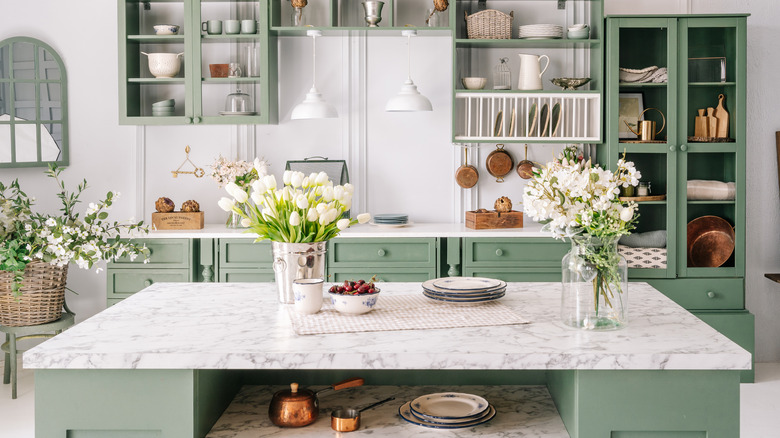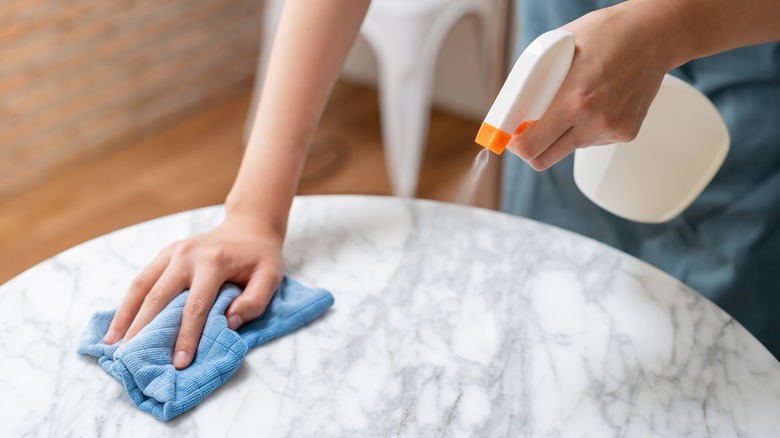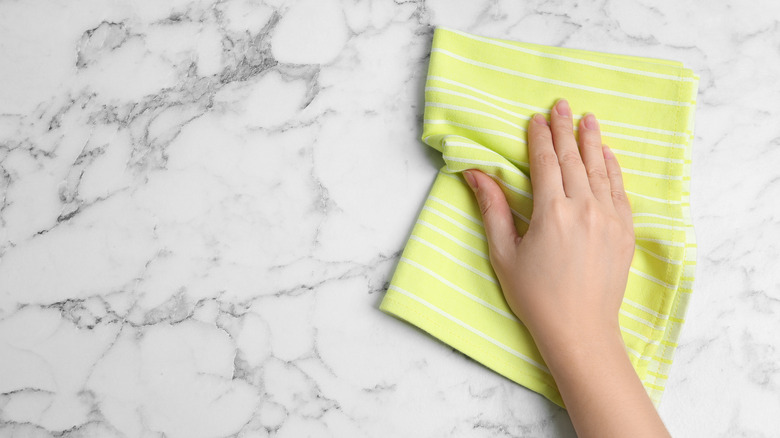How To Best Protect And Care For Marble To Avoid Damage
The Taj Mahal, the Leaning Tower of Pisa, and the Lincoln Memorial are stunning structures, but you might not have known that they are all made of marble (via CMP Stonemason Supplies). However, nowadays, the material is mostly found within residential homes, in the kitchen and bathroom in the form of countertops, tiles, and even flooring, since it brings a sense of luxury to a space that is hard to compare to other fabrics. Marble is ideal in classic and modern designs and goes really well with almost any color pallet. Still, it's mostly known as a countertop material for the kitchen because it holds up to extreme heat, and its naturally cooler temperature is perfect for bakers who need to keep their dough cold (via KNC Granite).
Unfortunately, it does have a few downsides, and the homeowners who avoid it do so because of its high maintenance. Compared to other materials like quartz, porcelain, and ceramic, marble is a delicate stone that needs a lot of attention. If the lure of elegant marble countertops is too much to resist, you might wonder how to care for and protect this luxurious canvas within your home.
What to avoid using on marble
According to G.M.S Wërks, marble is a sensitive material that can easily be damaged. Cleaning up messes as they happen is critical to avoid ruining the surface. Leaving acidic residue like tomato sauce, coffee, wine, and citrus fruits on the counter or tile will result in stains, dulling, or etching. When preparing food for meals, use cutting boards and wipe up any spills or splatters immediately. You'll also want to use a coaster for your wine and juice glasses and coffee cups to reduce the risk of a ring stain.
When cleaning a marble countertop or tile backsplash, you might be tempted to reach for your trusty vinegar or bleach. However, these types of cleaners are too harsh for this delicate surface. Other similar harsh cleaners will etch the surface and cause the marble to appear dull, and make it more susceptible to staining and damage in the future. Additionally, you'll want to avoid abrasive tools like scrubbers, steel wool, and stiff bristle brushes. Similar to harsh cleaners, these tools can scratch the surface of the marble and leave it vulnerable to further damage.
Cleaners to use and how to protect marble
Marble is starting to sound like a bit of a diva, but in reality, all you need is gentle detergent and regular sealing. For daily cleaning, you can use mild dish soap and warm water (via Custom Marble & Onyx). First, clean the countertop with this mixture with a soft sponge or rag, wipe it again with a clean wet rag, then try it with a microfiber cloth. This will remove any food debris, spills, and cooking grime that has accumulated over the day.
For stains that do happen, there's no need to panic. According to Custom Marble & Onyx, hydrogen peroxide can easily pull out a stain made by coffee, tea, or similar spills. You can try a few drops of ammonia if the smear isn't coming out. However, be careful when cleaning with ammonia, says Aalto; combining it with other solutions can make it toxic, so ensure the surface is clear of other chemicals before applying it.
You'll also want to invest in a marble-specific sealant to protect your countertop, backsplash, and flooring. Depending on the brand, you might have to reapply it every six months. While sealants won't keep stains from happening, it gives you more time to clean them up.


